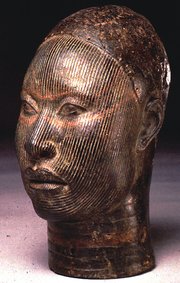Ife
|
|
Ifè (or Ilé-Ifè, as it is properly known) is an ancient Yorùbá city in south-western Nigeria. Evidence of settlement of the city has been discovered dating back as far as 500 BC.
Today a mid-sized city, Ifè is home to the Obafemi Awolowo University and Nigeria's Natural History Museum. Ifè has a strong claim to be the spiritual centre of the Yorùbá people. According to Yorùbá legend, Ifè is where the founding deities Odùduwà and Obàtálá began the creation of the world, as directed by the paramount deity Olódùmarè. Obàtálá created the first humans out of clay, while Odudua became the first divine king of the Yorùbá. The Òòni (King) of Ifè claims direct descent from the god Odudua, and is counted first among Yorùbá kings.
Between 700 and 900 A.D., Ifè began to develop as a major artistic centre, and the city was a settlement of substantial size between the 9th and 12th centuries, with houses featuring potsherd pavement. Ifè is known worldwide for its ancient and naturalistic bronze, stone and terracotta sculptures, which reached their peak of artistic expression between 1200 and 1400 A.D. After this period, production declined as political and economic power moved to the nearby kingdom of Benin.
It is located in the present day, Osun state. With a population of 501,952. Ife people are of the Yoruba ethnic group, the largest single ethnic group in Nigeria. Ife City has a local television station called NTA Ife. Ife city is home to various businesses. Ife City is the trade center for a farming region. Yams, cassava, grain, and tobacco are grown. Cotton is grown and used to weave cloth. Hotels in Ife include Hotel Diganga, Ife-Ibadan, Mayfair Hotel Ltd. Ife, P.O. Box 163 022-2102, 2254 Obafemi Awolowo University Guest House etc. Sport: Ife has a stadium with a capacity of 9,000 and a second division professional league team.

